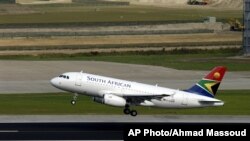It’s rare to see tobacco being smoked on airline flights these days, but in the near future, tobacco could be used to power commercial jetliners.
Boeing, South African Airways and SkyNRG have announced an initiative to create biofuel from a new kind of tobacco plant.
The hybrid plant, known as Solaris, was developed by SkyNRG, a Dutch firm, is nicotine free and, according to Julie Felgar, managing director for Boeing’s Environmental Strategy and Integration, has many more seeds than traditional tobacco plants.
For now, only the oil from the seeds will be used to make biofuel, but Felgar said technologies are being developed that could render fuel from the entire plant.
"By using hybrid tobacco, we can leverage knowledge of tobacco growers in South Africa to grow a marketable biofuel crop without encouraging smoking," said Ian Cruickshank, South African Airways Group Environmental Affairs Specialist in a statement. "This is another way that SAA and Boeing are driving development of sustainable biofuel while enhancing our region's economic opportunity."
There are two drivers pushing biofuel.
First, over the past decade, aviation fuel prices have been volatile and increasingly higher, Felgar said. This, she added, makes it hard to operate. She said fuel accounts for around 35 to 40 percent of airlines’ operating costs.
Secondly, airlines want to reduce their carbon footprint.
According to the International Air Transport Association, which represents 240 airlines, the aviation industry accounts for 2 percent of global, man-made carbon emissions. Five years ago, the group said the industry was committed to capping carbon emissions.
Boeing said sustainable biofuels could reduce carbon emissions “by 50 to 80 percent” compared to jet fuel.
That will be difficult for an industry that operates on razor thin margins and is expected to grow rapidly over the next 20 years. Felgar said Boeing expects orders of 36,000 planes over that time.
Boeing’s goal is that by 2016, the sustainable aviation biofuel supply will be capable of meeting 1 percent (600 million gallons) of global jet fuel demand.
Tobacco won’t be a panacea, but merely a piece of the puzzle in moving toward widespread use of biofuel. Today, biofuels power only a tiny sliver of flights.
Different regions of the world may have different biofuel solutions.
As potential source of biofuel in the United Arab Emirates, Boeing said it was looking at the viability of a halophyte plant that can be irrigated with seawater. In Brazil, the company said, biofuels have been made from sugar cane. Another source can be found in discarded chicken fat.
Felgar said it’s hard to predict when airlines’ use of biofuels will take off, but that developments over the past 7 to 8 years would indicate an “inflection point is coming up.”
Other factors will help as well, such as better designed aircraft and more efficient operations on the ground, Felgar said.
While many biofuels have been criticized for infringing on food crops, using water and land that could be used to grow consumable plants, Felgar said Boeing is working to ensure its biofuel is sustainable.
Felgar said South Africa was a logical choice for this initiative because “South African Airlines is very progressive in their environmental commitment,” and that using the hybrid tobacco will help rural tobacco farmers who have been negatively impacted by decreasing demand for their product.




